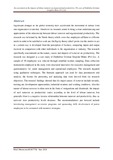Please use this identifier to cite or link to this item:
https://cris.library.msu.ac.zw//handle/11408/2676| Title: | An assessment on the impacts of labour turnover on organisational productivity: the case of Zimbabwe German Graphite Mines (Pvt) Ltd | Authors: | Mawodzwa, Rita C. | Keywords: | Labour turnover Organisational productivity |
Issue Date: | 2014 | Publisher: | Midlands State University | Abstract: | Significant changes in the global economy have accelerated the movement of labour from one organization to another. Therefore the research aimed to bring a clear understanding and appreciation of the relationship between labour turnover and organizational productivity. The research was informed by the Needs theory which show that employees affiliate to different needs in order to be satisfied at work and the Equity theory which posits that the motive to act in a certain way is developed from the perception of fairness, comparing inputs and output received in comparison with other individuals in the organisation or industry. The research specifically concentrated on the nature, causes and impacts of turnover on productivity. The research was designed as a case study of Zimbabwe German Graphite Mines (Pvt) Ltd. A sample of 50 employees was selected through stratified random sampling. Data collection instruments employed in the study were structured interviews for executive management and questionnaires for junior management and operational employees. The research inquired using qualitative techniques. The thematic approach was used for data presentation and analysis, the themes for presenting and analysing data were derived from the research objectives. The research findings showed that the major causes of turnover include rewards, training and development opportunities, industrial relations and working conditions. Also the nature of labour turnover is often seen in the form of resignations and dismissals, the impact of such turnover on productivity varies according to the level of labour turnover, but generally there is a negative inverse relationship between turnover and productivity, thus as turnover rises productivity levels decrease. The recommendations put forward include introducing management succession programs and sponsoring skills development of junior employees to be cemented with retention strategies. | URI: | http://hdl.handle.net/11408/2676 |
| Appears in Collections: | Bachelor Of Commerce Accounting Honours Degree |
Files in This Item:
| File | Description | Size | Format | |
|---|---|---|---|---|
| Final Dissertation Rita Mawodzwa.pdf | Full Text | 974.59 kB | Adobe PDF |  View/Open |
Page view(s)
298
checked on Feb 11, 2026
Download(s)
1,316
checked on Feb 11, 2026
Google ScholarTM
Check
Items in MSUIR are protected by copyright, with all rights reserved, unless otherwise indicated.



